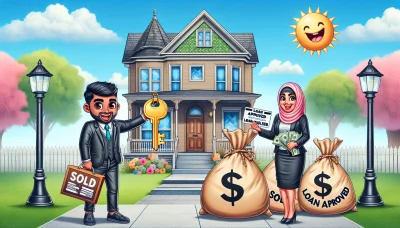How to qualify for fha Quiz
Test Your Knowledge
Question of
Understanding FHA Loans
What is an FHA Loan?
FHA loans are a type of government-backed mortgage insured by the Federal Housing Administration. They are designed to help low-to-moderate income borrowers afford a home.
The History of FHA Loans
FHA loans were introduced during the Great Depression to encourage homeownership by providing mortgage lenders with adequate insurance and helping borrowers qualify for a loan with a lower down payment.
FHA Loans vs. Conventional Loans
Unlike conventional loans, FHA loans are backed by the government, offering lenders protection against default. This allows for more lenient credit and down payment requirements.
Benefits of FHA Loans
Lower Down Payment Requirements
One of the most appealing features of FHA loans is the low down payment requirement, which can be as low as 3.5% of the purchase price.
More Lenient Credit Score Criteria
FHA loans have more lenient credit score requirements than conventional loans, making them more accessible to a wider range of borrowers.
Eligibility Criteria for FHA Loans
Borrower Eligibility Requirements
To qualify for an FHA loan, borrowers must have a steady employment history, a valid Social Security number, and meet certain income and credit score criteria.
Property Eligibility Requirements
The property must meet certain safety, security, and soundness (structural integrity) standards and be appraised by an FHA-approved appraiser.
Preparing for FHA Loan Application
-
Assessing Your Financial Health
- Calculating Your Debt-to-Income Ratio
- Checking Your Credit Score
-
Gathering Necessary Documentation
- Employment Verification and Income Documentation
- Asset and Liability Statements
-
Understanding the Role of Down Payments
- Minimum Down Payment for FHA Loans
- Sources of Down Payment Funds
Navigating FHA Loan Limits
Understanding Loan Limits
How Loan Limits Are Determined
Loan limits are set by the Federal Housing Administration (FHA) and are revised annually based on changes in home prices. They reflect the maximum amount that can be borrowed under an FHA loan in a particular area.
The Impact of Location on Loan Limits
Location plays a crucial role in determining FHA loan limits. Areas with higher real estate prices often have higher loan limits to accommodate the cost of purchasing a home. Conversely, areas with lower housing costs tend to have lower loan limits.
Strategies for Staying Within Loan Limits
Adjusting Your Budget
To stay within FHA loan limits, you may need to adjust your budget. This could involve looking for homes that are priced within the loan limit for your area or considering properties that need some work, as they may be more affordable.
Exploring Different Neighborhoods
Exploring different neighborhoods can also help you find a home within FHA loan limits. Prices can vary significantly between neighborhoods, so widening your search may uncover more affordable options.
What to Do If You Exceed Loan Limits
Considering Other Financing Options
If you find a home that exceeds FHA loan limits, you may need to consider other financing options. This could include conventional loans, which may have higher loan limits or different lending criteria.
Evaluating the Pros and Cons of Jumbo Loans
Jumbo loans are another option for financing expensive homes that exceed FHA loan limits. However, they often come with stricter credit requirements and larger down payments. Evaluating the pros and cons of jumbo loans is essential to determine if they are the right choice for you.
The Importance of Mortgage Insurance
What is FHA Mortgage Insurance?
FHA mortgage insurance is a type of insurance that protects lenders against losses if a homeowner defaults on their mortgage. It is required for all FHA loans and includes two main components:
- Upfront Mortgage Insurance Premium (UFMIP): This is a one-time fee paid at the time of loan closing. It is typically financed into the loan amount.
- Annual Mortgage Insurance Premium (MIP): This is an ongoing fee that is included in your monthly mortgage payments. The cost varies depending on the loan's term and loan-to-value ratio.
Calculating Your Mortgage Insurance Costs
To understand the full cost of your FHA loan, it's important to calculate both types of mortgage insurance premiums:
- Estimating the UFMIP: The UFMIP is calculated as a percentage of your loan amount. To estimate your UFMIP, you will need to multiply your loan amount by the current UFMIP rate.
- Budgeting for Annual MIP Expenses: The annual MIP is also a percentage of your loan amount, but it's divided over 12 months and added to your monthly mortgage payment. To budget for your annual MIP expenses, determine the annual rate and divide by 12 to find the monthly cost.
How Mortgage Insurance Affects Your Loan
Mortgage insurance has significant impacts on your FHA loan, including:
- Long-Term Cost Implications: While FHA loans allow for a smaller down payment, the added cost of mortgage insurance can make the loan more expensive over the life of the loan compared to conventional loans without PMI (Private Mortgage Insurance) for borrowers with good credit and a sufficient down payment.
- Termination of Mortgage Insurance: Unlike some types of mortgage insurance, FHA MIP does not automatically terminate when you reach a certain equity level in your home. In many cases, you may need to refinance into a different loan type to remove the mortgage insurance.
Working with FHA-Approved Lenders
Finding the Right FHA Lender
- Researching Lender Reputation and Experience
- Comparing Loan Terms and Rates
The Loan Application Process
- Pre-Approval Steps and Expectations
- Completing the Official Loan Application
Closing on Your FHA Loan
- Understanding Closing Costs and Fees
- Finalizing the Loan Agreement
Maintaining FHA Compliance Post-Purchase
Meeting Your Mortgage Obligations
- Timely Mortgage Payments
- Avoiding Default and Foreclosure
Refinancing an FHA Loan
- When to Consider Refinancing
- Streamline Refinance Program for FHA Loans
Selling a Home with an FHA Loan
- Understanding the Implications of Selling Early
- Transferring an FHA Loan to a New Buyer












